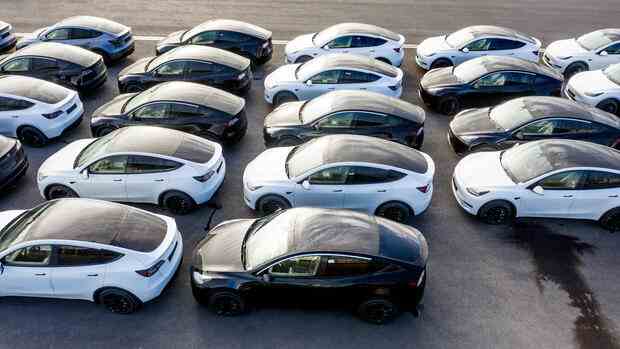Tesla has not or only insufficiently published environmental data.
(Photo: IMAGO/Jochen Eckel)
Dusseldorf Professional investors pay close attention when the Carbon Disclosure Project (CDP) releases its annual rankings. The data from the environmental organization is considered the gold standard when it comes to evaluating mostly listed companies with regard to the ecological criteria of climate protection, water security and forest use.
The ratings can be used to assess the environmental data that companies voluntarily submit. However, only very few receive the top grade AAA, which certifies excellent data quality in all three categories – namely only twelve of a total of 15,000 participating companies worldwide.
Only those who receive the best grade in at least one category make it onto the so-called A-list. This year, 15 German companies succeeded. 333 companies worldwide made it, i.e. around 2.2 percent. Most of these companies are based in Great Britain (29), followed by France (24) and Spain (17).
One of them is the Nivea manufacturer Beiersdorf, as the Handelsblatt learned in advance. From France, the food giant Danone, the cosmetics producer L’Oréal and the luxury group LVMH made it onto the list. A total of eight companies from Europe can be found among the top twelve. In addition to those already mentioned, these include Firmenich, Lenzing, Metsä Board and UPM-Kymmene.
Top jobs of the day
Find the best jobs now and
be notified by email.
The CO2 emission data, which many companies still do not collect and publish properly, are of great importance for the evaluation. According to the CDP, in 2022 there were a total of 29,500 companies that did not publish their environmental data or only published it insufficiently and were rated with the grade F – including the oil company Exxon Mobil, the delivery service Hello Fresh and the electric car manufacturer Tesla.
CDP ranking: Great Britain is ahead
The CDP was founded in 2000 as a non-profit organization to standardize and collect climate data from companies and municipalities. Numerous institutional investors support the project, including major banks such as Deutsche Bank, UBS and Goldman Sachs. They use the data, among other things, to assess the future viability of a company or to offer sustainable financial products.
According to Laurent Babikian, head of the Global Capital Markets team at CDP, investor interest in such environmental data has recently increased significantly. “Many have made commitments themselves as part of industry initiatives to reduce the carbon footprint of their portfolios,” the expert told Handelsblatt. “At the same time, the regulatory requirements for the publication of data are increasing.”
For example, the so-called taxonomy regulation has been in force in the EU since this year, which is intended to clearly define which economic activities can be considered sustainable. In this context, financial institutions with more than 500 employees are obliged to report on the environmental impact of their portfolios – and for this they are dependent on reliable information from the companies in which they invest.
Anyone withholding emission data could find it more difficult to refinance themselves on the capital market in the future. For example, CDP expert Babikian estimates that financial institutions could soon make their credit conditions dependent on environmental indicators. “We are already observing this trend today, for example in the area of sustainability bonds, whose interest rate is linked to the achievement of environmental goals.”
More: The consultants’ new billion dollar business: the decarbonization of the German economy
